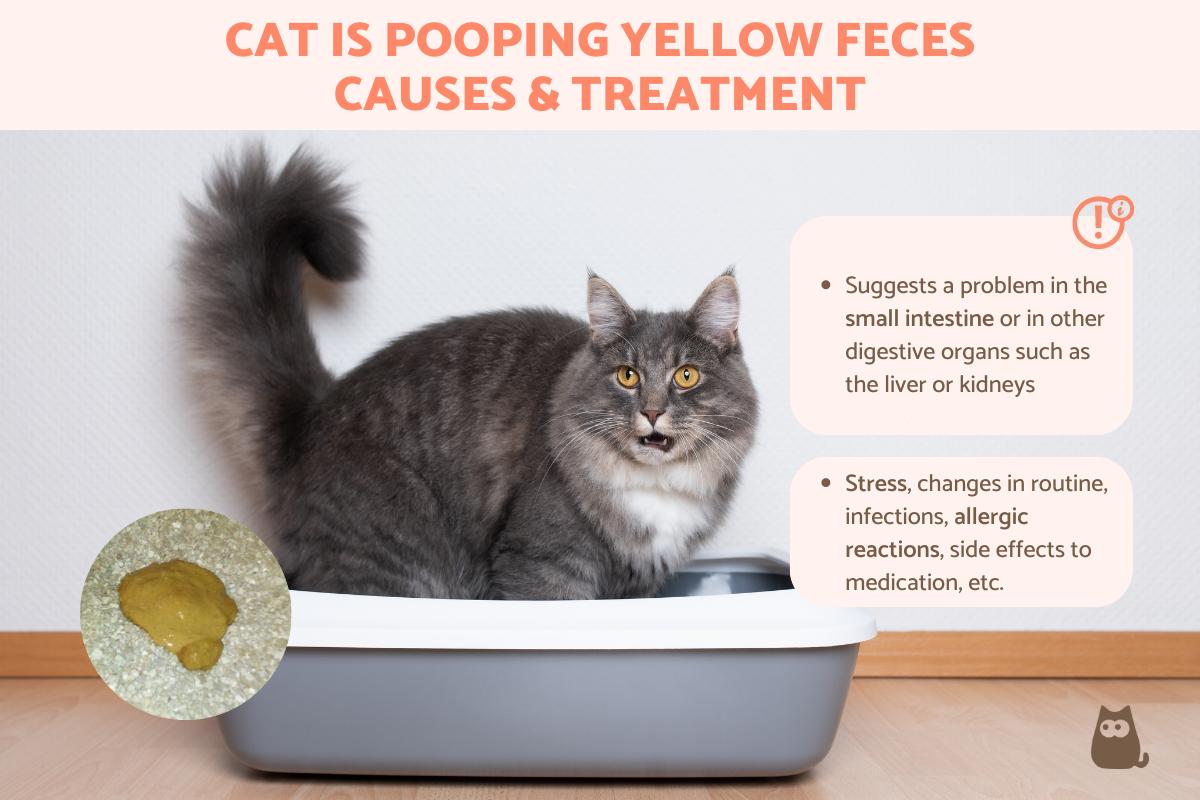My Cat Is Pooping Yellow Feces - Causes and Treatment



See files for Cats
When a cat is pooping yellow feces, their guardian must take note. Changes in either the color or consistency of the cat's feces can indicate a problem with their health and wellbeing. While stress and other psychological issues can lead to changes to a cat's poop such as diarrhea, changes in color are usually either related to something they have ingested or to an underlying disease. Normal cat poop should be brown in color and of a firm, but not hard consistency. Different colors and consistencies can indicate different possibilities, with yellowish cat poop meaning certain health issues are likely.
At AnimalWised, we discover what these health issues might be by looking at why my cat is pooping yellow feces. We discover the causes and treatment of yellowish poop in cats, but we stress that the problem must be diagnosed by a qualified veterinarian if we see our cat has yellow feces.
Causes of yellow feces in cats
As stated in the introduction, a healthy cat should have feces which is brown in color and firm in consistency. If it is too wet, too dry or of an abnormal color such as yellow, green or even red, the indication is the cat has a health problem. Gastrointestinal symptoms are a common indicator of various problems in a cat, often being the first issue a guardian observes. The specificity of the symptoms can help indicate their origin.
The change in the color of the stool towards a more yellowish tone is generally associated with an alteration in the small intestine. It may also be linked to problems with other digestive organs such as the pancreas or liver. This is partly because bile can often be yellow in color, so bile in the feces can give it a yellow tone.
Generally speaking, this change in color does not occur on its own. It is usually accompanied by an increase in the stool's water content. For this reason, if a cat is pooping yellow feces, it is common for it to be more liquid in consistency. When this occurs, we often see the cat has yellow diarrhea.
Causes of yellow poop in cats
As stated above, it is common for the cat to have diarrhea if their poop has turned yellow. Diarrhea is loosely defined as loose stools with a high water content. It is also commonly associated with a higher rate of defecation than usual, although this is not necessarily the case. You can learn more about the basics with our article on the causes of diarrhea in cats.
For us to know whether a cat has diarrhea, we need to look at their litterbox. Too many cat guardians do not check their feline's feces regularly, but it is very important to do so. For us to know if and when a change occurs, we need to know what our cat's normal stool looks like.
One of the characteristics that help us determine the origin of the diarrhea is color. Diarrhea originating in the small intestine most commonly results in changes to color. If the diarrhea originates in the large intestine, changes in the poop's color are not usual.
If we observe yellowish cat poop or diarrhea, it is most likely that there is an alteration at the level of the small intestine. The duration of the gastrointestinal problem is also indicative. Diarrhea that lasts up to three weeks is considered acute and is considered chronic if it lasts longer than three weeks.
The most frequent causes of small intestine diarrhea causing a cat to poop yellow feces are the following:
- Dietary problems: these include sudden changes in the diet, intake of food not suitable for cats or ingestion of foreign bodies (such as bones, etc.).
- Stress: cats are animals of routine and changes to their environment can easily cause stress and anxiety. This can result in diarrhea, although it is not usually a direct cause of yellow poop. It can weaken their immune system and make other causes of yellow poop in cats more likely.
- Drugs: non-steroidal anti-inflammatory drugs (NSAIDs) are a relatively common cause of yellow diarrhea in cats, but certain antibiotics, antiparasitics and other drugs can result in this symptom.
- Infectious or parasitic diseases: caused by bacteria, viruses (e.g. coronaviruses or feline panleukopenia virus), protozoa (e.g. Giardia), nematodes, etc.
- Exocrine pancreatic insufficiency: this pathology causes the destruction of pancreatic tissue, resulting in insufficient production of digestive enzymes. As a consequence, mustard-colored diarrhea occurs. Remains of undigested food are also usually seen in the cat's yellow stool.
- Liver disorders: such as liver failure or severe cholestasis. Bile salts are essential for the digestion and absorption of fats. If the liver is affected and cannot produce bile, or if it cannot reach the intestine, a maldigestion syndrome occurs that triggers the appearance of diarrhea, as well as other symptoms of liver failure in cats.
- Inflammatory bowel disease (IBD): this is an idiopathic disease (i.e. it is of unknown origin), in which an inflammatory process occurs in the intestinal mucosa that prevents the absorption of nutrients. In turn, this causes an increase in osmotic pressure in the intestinal lumen, water retention and the appearance of diarrhea. This pathology usually produces very watery diarrhea which is of a mustard yellow color when the inflammatory bowl disease in cats affects the small intestine.
- Food allergies or intolerances: food allergies occur when the animal's immune system reacts abnormally to certain components of food. Intolerances occur when there is a metabolic defect that prevents the correct digestion of some component of the diet. Learn more with our article on the most common food allergies in cats.
- Small intestine tumors: mainly lymphomas and carcinomas. Digestive lymphoma is the most common type of tumor in older cats which can result in the cat pooping yellow feces.
My kitten has yellow poop
While diarrhea in adult cats is a problem, it is particularly worrying in younger cats. Kittens have not yet developed a robust immune system, so diarrhea can indicate a serious problem which can worsen quickly. However, the causes of yellow diarrhea in kittens are essentially the same as in adult cats. This means they include the following:
- Drugs or toxins
- Food intolerance or allergy
- Infections (bacterial, viral or parasitic)
- Changes in diet
- Stress due to environmental changes
- Diseases of the liver, pancreas or metabolic disorders
With adult cats, we can often wait a little longer to see if the changes in defecation are acute. However, kittens need their issues to be addressed quickly, especially if they are showing other signs of illness. Learn more with our article on why a kitten has diarrhea, but otherwise acts normal.
What to do if my cat has yellow poop
If you have detected that your cat's feces have a light brown or yellowish color, it is most likely that there is a pathological origin of this symptom. While we have already looked at the possible causes of yellow poop in cats, we cannot diagnose the problem ourselves. This requires the expertise of a qualified veterinarian. They will be best placed to both diagnose the problem and choose the right course of treatment.
Whenever possible, a specific treatment should be established against the pathology that is causing the problem. This will depend on the underlying cause. For example, antibiotics are used to treat a bacterial infection, antiparasitic drugs will kill a parasite infestation and antihistamines may be used for an allergic reaction.
Many of the causes of diarrhea in cats don't have a specific treatment. This is the case with viral diseases or even some intoxications. For this reason, the treatment will be based on supporting the animal as their body's immune system fights the problem, as well as symptom management.
In these cases, symptom management can include:
- Providing a diet for cats with digestive problems: in cases of diarrhea, fasting was routinely recommended in the past. However, it has been shown that fasting delays the recovery of the digestive system. For this reason, it is currently recommended to provide a highly digestible diet (with little fat and little insoluble fiber). We should also avoid digestive overload by breaking down their total food into smaller portions.
- Maintain hydration: with diarrhea there is a significant loss of water and electrolytes. It may be convenient to provide an oral rehydration agent which is specially formulated for administration to small animals. This can help maintain the animal's hydration and electrolyte balance. Learn more with our article on whether a cat is dehydrated.
- Analgesics: if the cat is in pain, pain relievers may be used to improve their wellbeing during this time. Some pain medications can worsen the diarrhea, so it is very important you don't give them anything without express permission from the vet.
The context of a cat's defecation can also help us to understand the underlying problem. Learn more with our article on why my cat keeps pooping on the bed.

How to prevent yellow poop in cats
To avoid the appearance of this type of alterations in the coloration and consistency of the cat's feces, we must prevent any possible underlying causes. To do so, we need to do the following:
- Provide an adequate diet: a cat's diet needs to be well balanced and adapted to the needs of the individual animal. Whenever a diet change is made, it should be done gradually, without sudden changes. It is important to avoid providing food that is not suitable for cats and prevent them from having access to foreign bodies that could damage the digestive system of these animals.
- Vaccination and deworming schedules: especially in cats that have outside access or have regular contact with other animals.
- Isolate sick animals: if our cat is sick and there are other animals in the home, we need to isolate the affected feline. We also need to clean any accessories they have or areas in which they have spent time. This will help to prevent the spread of any pathogens that may result in yellow poop.
Other pathologies mentioned throughout this article can be difficult to prevent, especially those of them which are idiopathic, i.e. of unknown origin. Making an early diagnosis will increase the effectiveness of any treatment and improve the prognosis of the animal. In the event of any alteration in the color or consistency of your cat's feces, do not hesitate to go to your trusted veterinary center to diagnose the problem and administer treatment if necessary.

This article is purely informative. AnimalWised does not have the authority to prescribe any veterinary treatment or create a diagnosis. We invite you to take your pet to the veterinarian if they are suffering from any condition or pain.
If you want to read similar articles to My Cat Is Pooping Yellow Feces - Causes and Treatment, we recommend you visit our Intestinal problems category.






